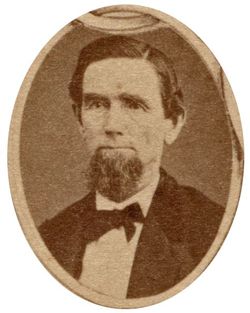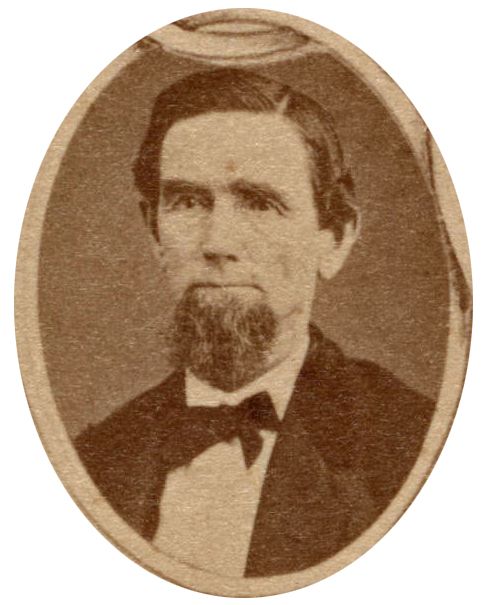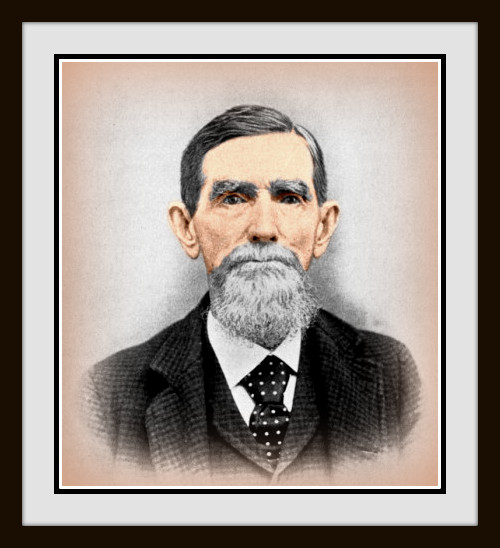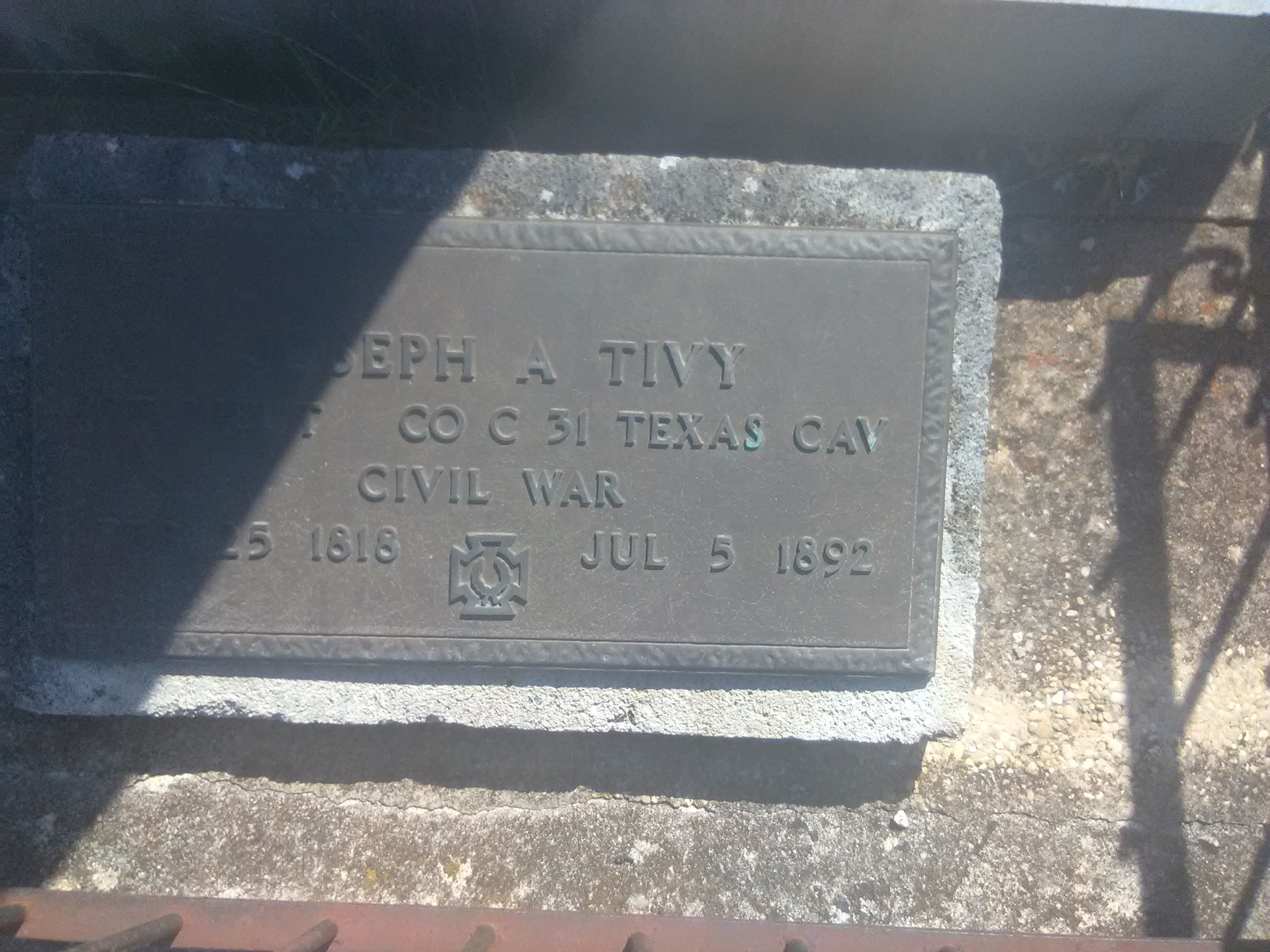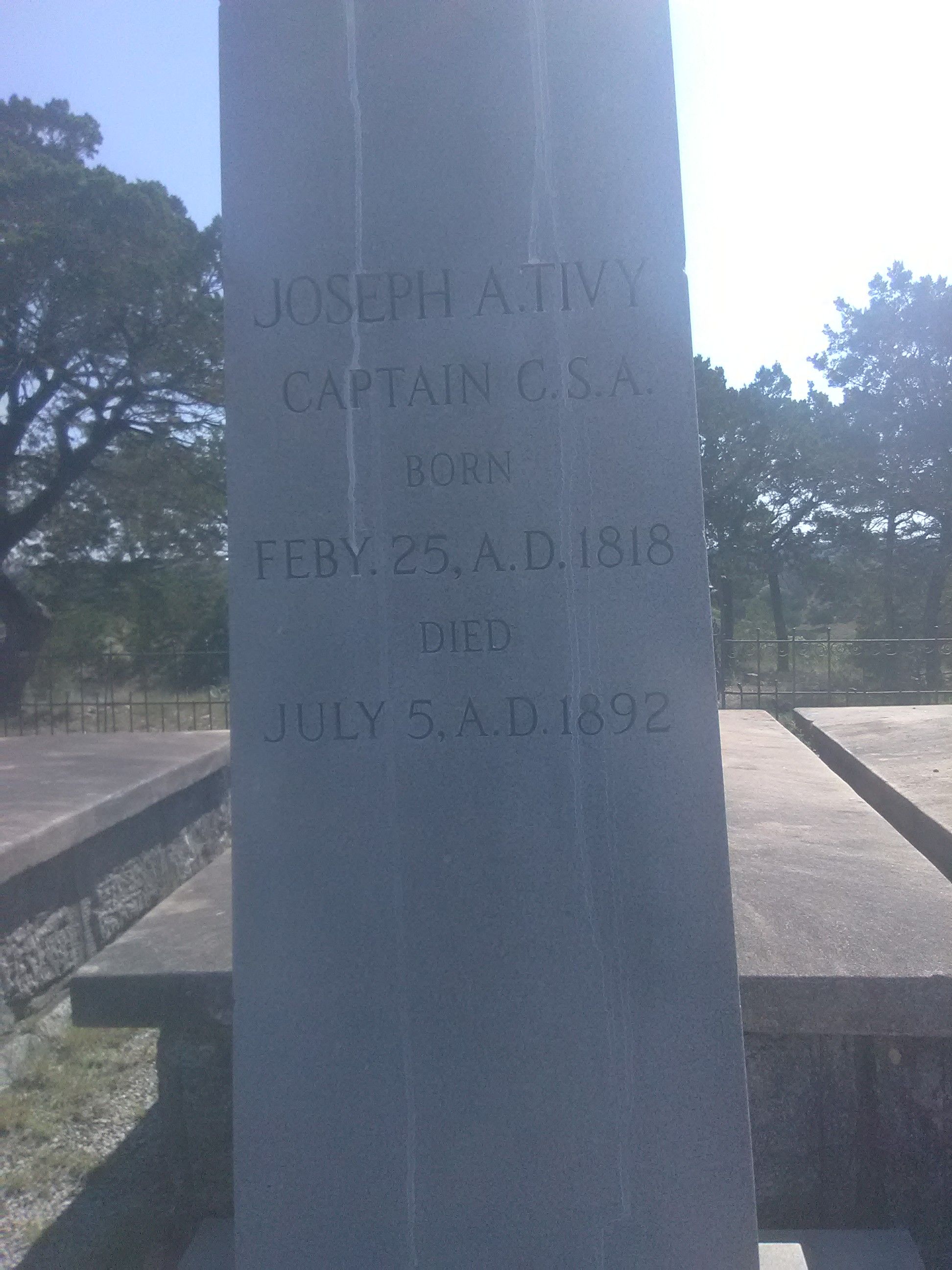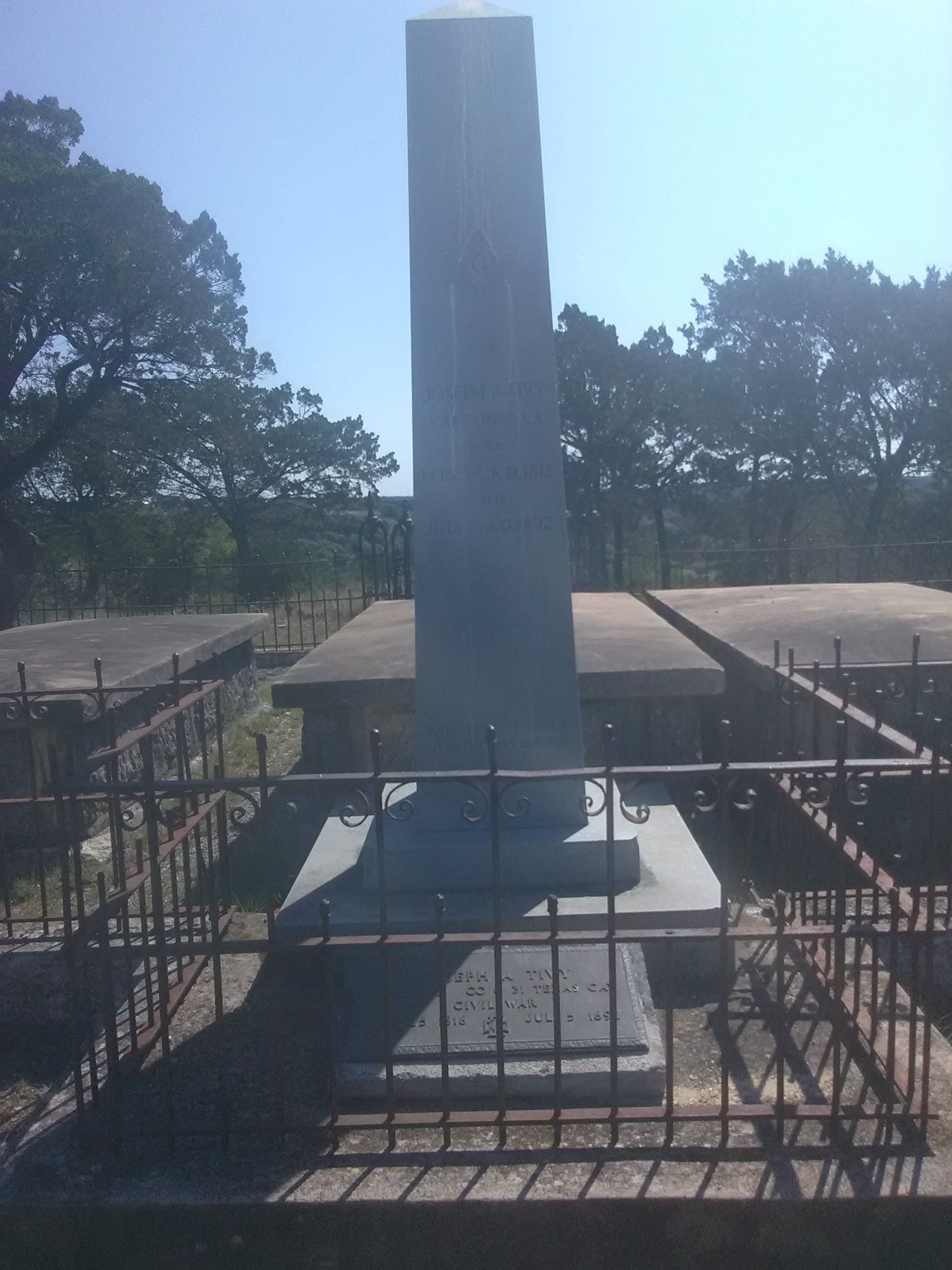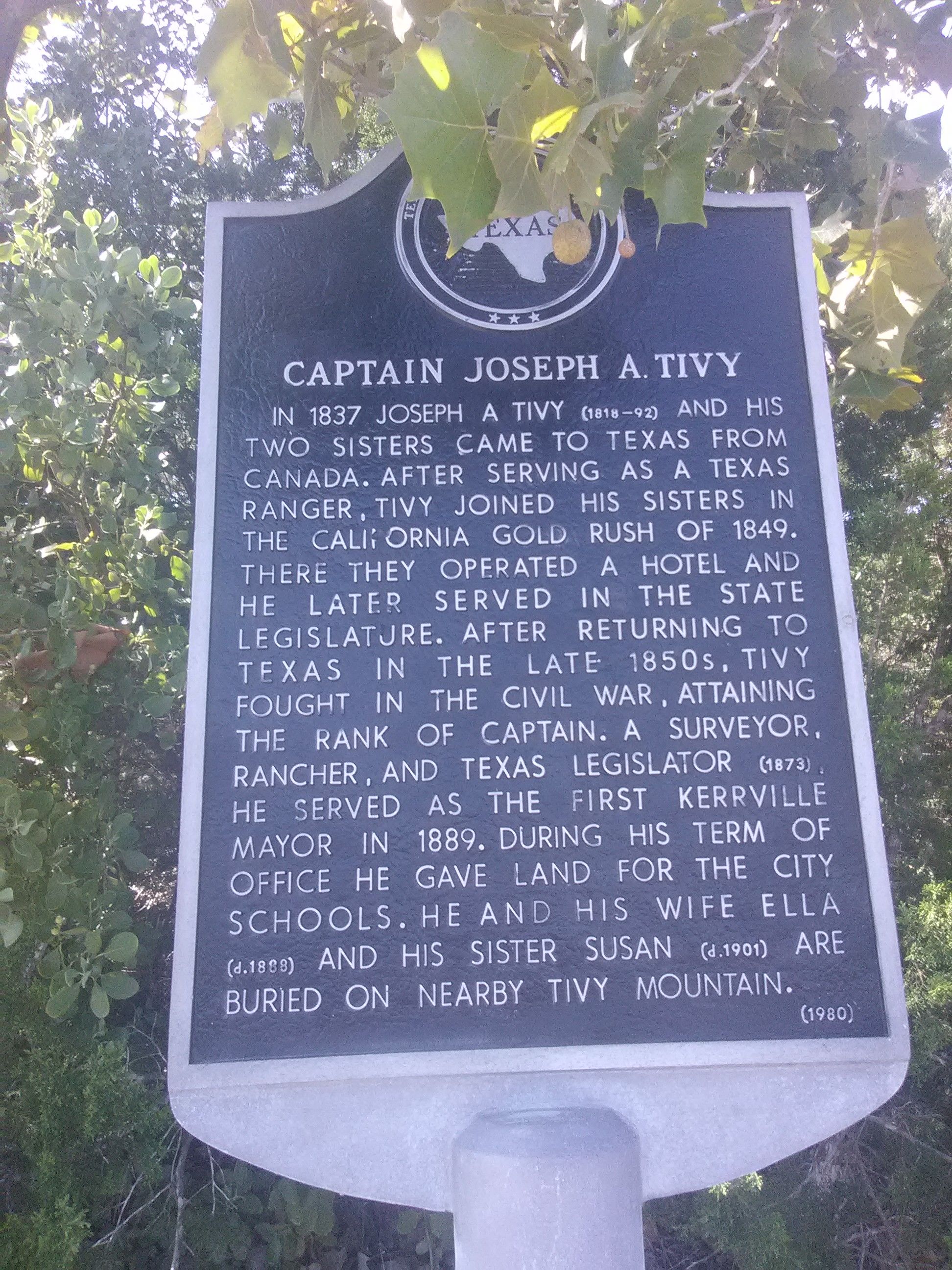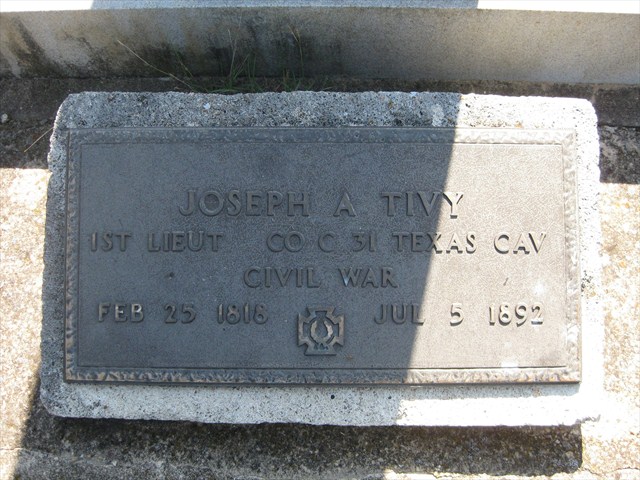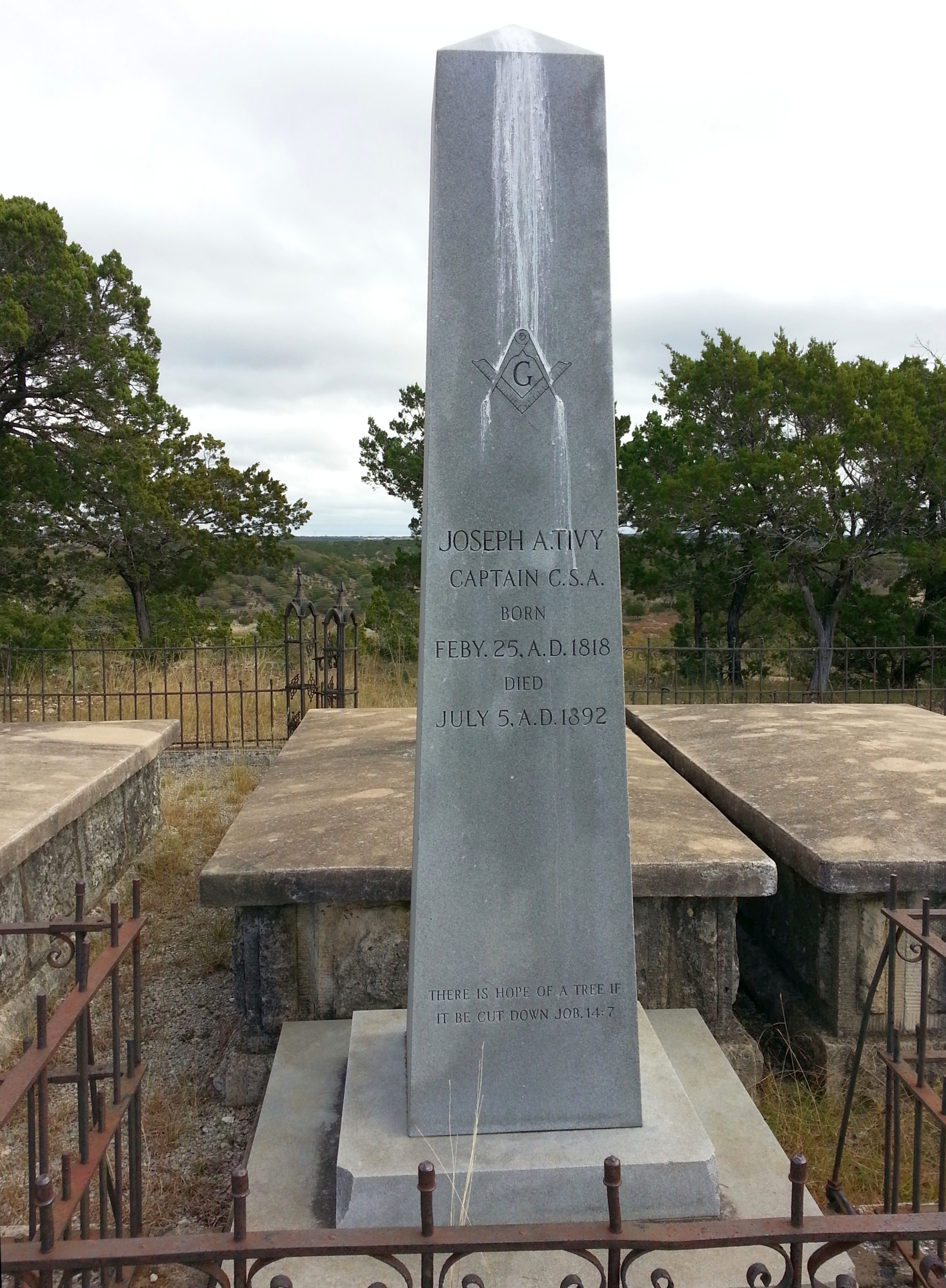In 1844 be went to San Antonio and joined Col. Jack Hays' Rangers, and remained with that company about a year. In 1845 he was appointed deputy surveyor of Bexar District, and in that year surveyed and made the locations in Gillespie County. In 1846 he surveyed the lands on the upper portion of the Guadalupe river. From 1846 to 1849 he was often interrupted in the work of surveying by hostile Indians. During 1847 he completed the surveys on the San Saba. One day during this time while in camp with about twenty men, he was visited by Ketemsey, a celebrated chief of the Comanches, and ordered not to mark any more trees up there, the chief pointing at the same time to a range of hills and saying: " That is the white man's line." But these orders were not obeyed, the whites being armed with rifles and revolvers and the Indians having only bows and arrows and spears.
In the spring of 1849, Capt. Tivy took the California fever and, in company with several others, set out in June for the Pacific Coast. They reached San Gabriel Valley in Southern California, in October following, after many trials and much suffering and went into camp for the winter at Mission San Gabriel. In the spring of 1850, the party resumed its journey and finally reached the mines by way of Tejon Pass. Here Capt. Tivy went into the hotel business, renting the "United States Hotel " at $200 per month. The building was made of stakes and poles and roofed with canvas. There was only one long, narrow room which was used as a dining room. On the sides and ends of this the lodgers were bedded in bunks arranged one above the other. The cooking was all done in the open air, excepting the baking, at which two men were kept busy almost day and night, so great was the demand for pies, cakes and bread. The rate charged for board and lodging was $3.00 per day in gold dust, there being no coin.
After following this occupation for a few months Mr. Tivy sold out and went to mining, which he followed a little over two years. He then went into the mercantile business, which he followed for about a year. In July, 1853, Tulare County was organized and he was elected county surveyor. In connection with his official duties he went to farming and employed successfully a band of Indians, whom he trained to agricultural pursuits. These he would have liked to retain, but Gen. Fremont, having secured a contract from the general government to feed all the Indians of that locality at so much per head, they were taken away from him and transported to a point near the base of supplies. The same year he was appointed United States Deputy Surveyor of California and elected to the Legislature and served in the Legislature during the winter of 1853-4. In the spring of 1855 he was ordered by the surveyor-general to run a line through the Sierra Nevada mountains, accomplished the task and ran the first correct standard line run through those mountains. The expedition was full of perilous adventures and hair-breadth escapes from Indians and grizzly bears. In 1857 he went from California to New Mexico and in the fall of 1858 returned to Texas and settled in Karnes County, where he engaged in raising horses and mules. In 1862 he enlisted in the Confederate army, becoming a Lieutenant in Capt. John H. Dunkard's Company. In the fall of the same year he was promoted to the position of First-Lieutenant, and later put in command of the company and held this position until the fall of 1864. In the meantime his health had become impaired and he was finally forced to quit the service.
Being still in feeble health, on the recommendation of his physician he moved to Kerr County in 1872 and settled on a tract of land (on which Kerrville now stands) which he had located while surveying in that section in the " forties." In 1873 he was elected to the Legislature. From 1874 to 1888 he engaged in farming. On the establishment of Kerrville in 1888 he was made the first mayor of the place. As soon as the town was incorporated he donated to it sixteen acres of land for a school building and grounds and later donated other lots (in all more than one hundred acres) for the erection of buildings and for other improvements. He watched the growth of the town from its inception and always manifested a liberal spirit in promoting its interests.
He married late in life, his wife being Mrs. Ella Losee, widow of Dr. Henry Losee, a United States army surgeon who died at Kerrville. She died three or four years before Capt. Tivy. His death occurred July 5th, 1892.
For some time he had been actively engaged in overseeing the work of boring for artesian water on his place. Owing to his advanced age and physical condition, this undue activity and exposure brought on stomach complications which proved to be the immediate cause of his demise. He was a member of the Masonic fraternity. Religious services were conducted at the church and services at the grave by Kerrville Lodge No. 697, A. F. and A. M., and Burleson Chapter Royal Arch Masons of San Antonio. A large delegation from Rising Star Lodge were also present from Center Point. The funeral cortege consisted of more than one hundred carriages and was the largest ever seen in the town.
He was laid to rest on the summit of the mountain beside his beloved wife. He was greatly beloved by the entire community and the people omitted no mark of respect to his memory that friendship for him and admiration for his character could prompt. He was associated as a brave companion with men whose deeds have made Texas famous. He maintained throughout a life marked with many hardships, vicissitudes and perils a character unsullied by a single stain. He was modest, truthful, generous and kind and devoted to his God, his country, his family and his friends. He accumulated a handsome fortune. By his last will and testament he constituted his sister. Miss Susan Tivy, his sole legatee and she and Judge A. McFarland were made executors without bond. Mr. Tivy was one of the noblest representatives of the noblest race of pioneers that the world has ever known. (Indian Wars and Pioneers of Texas, by John Henry Brown, Published by L. E. Daniell, Austin, Texas, 1890 -
In 1844 be went to San Antonio and joined Col. Jack Hays' Rangers, and remained with that company about a year. In 1845 he was appointed deputy surveyor of Bexar District, and in that year surveyed and made the locations in Gillespie County. In 1846 he surveyed the lands on the upper portion of the Guadalupe river. From 1846 to 1849 he was often interrupted in the work of surveying by hostile Indians. During 1847 he completed the surveys on the San Saba. One day during this time while in camp with about twenty men, he was visited by Ketemsey, a celebrated chief of the Comanches, and ordered not to mark any more trees up there, the chief pointing at the same time to a range of hills and saying: " That is the white man's line." But these orders were not obeyed, the whites being armed with rifles and revolvers and the Indians having only bows and arrows and spears.
In the spring of 1849, Capt. Tivy took the California fever and, in company with several others, set out in June for the Pacific Coast. They reached San Gabriel Valley in Southern California, in October following, after many trials and much suffering and went into camp for the winter at Mission San Gabriel. In the spring of 1850, the party resumed its journey and finally reached the mines by way of Tejon Pass. Here Capt. Tivy went into the hotel business, renting the "United States Hotel " at $200 per month. The building was made of stakes and poles and roofed with canvas. There was only one long, narrow room which was used as a dining room. On the sides and ends of this the lodgers were bedded in bunks arranged one above the other. The cooking was all done in the open air, excepting the baking, at which two men were kept busy almost day and night, so great was the demand for pies, cakes and bread. The rate charged for board and lodging was $3.00 per day in gold dust, there being no coin.
After following this occupation for a few months Mr. Tivy sold out and went to mining, which he followed a little over two years. He then went into the mercantile business, which he followed for about a year. In July, 1853, Tulare County was organized and he was elected county surveyor. In connection with his official duties he went to farming and employed successfully a band of Indians, whom he trained to agricultural pursuits. These he would have liked to retain, but Gen. Fremont, having secured a contract from the general government to feed all the Indians of that locality at so much per head, they were taken away from him and transported to a point near the base of supplies. The same year he was appointed United States Deputy Surveyor of California and elected to the Legislature and served in the Legislature during the winter of 1853-4. In the spring of 1855 he was ordered by the surveyor-general to run a line through the Sierra Nevada mountains, accomplished the task and ran the first correct standard line run through those mountains. The expedition was full of perilous adventures and hair-breadth escapes from Indians and grizzly bears. In 1857 he went from California to New Mexico and in the fall of 1858 returned to Texas and settled in Karnes County, where he engaged in raising horses and mules. In 1862 he enlisted in the Confederate army, becoming a Lieutenant in Capt. John H. Dunkard's Company. In the fall of the same year he was promoted to the position of First-Lieutenant, and later put in command of the company and held this position until the fall of 1864. In the meantime his health had become impaired and he was finally forced to quit the service.
Being still in feeble health, on the recommendation of his physician he moved to Kerr County in 1872 and settled on a tract of land (on which Kerrville now stands) which he had located while surveying in that section in the " forties." In 1873 he was elected to the Legislature. From 1874 to 1888 he engaged in farming. On the establishment of Kerrville in 1888 he was made the first mayor of the place. As soon as the town was incorporated he donated to it sixteen acres of land for a school building and grounds and later donated other lots (in all more than one hundred acres) for the erection of buildings and for other improvements. He watched the growth of the town from its inception and always manifested a liberal spirit in promoting its interests.
He married late in life, his wife being Mrs. Ella Losee, widow of Dr. Henry Losee, a United States army surgeon who died at Kerrville. She died three or four years before Capt. Tivy. His death occurred July 5th, 1892.
For some time he had been actively engaged in overseeing the work of boring for artesian water on his place. Owing to his advanced age and physical condition, this undue activity and exposure brought on stomach complications which proved to be the immediate cause of his demise. He was a member of the Masonic fraternity. Religious services were conducted at the church and services at the grave by Kerrville Lodge No. 697, A. F. and A. M., and Burleson Chapter Royal Arch Masons of San Antonio. A large delegation from Rising Star Lodge were also present from Center Point. The funeral cortege consisted of more than one hundred carriages and was the largest ever seen in the town.
He was laid to rest on the summit of the mountain beside his beloved wife. He was greatly beloved by the entire community and the people omitted no mark of respect to his memory that friendship for him and admiration for his character could prompt. He was associated as a brave companion with men whose deeds have made Texas famous. He maintained throughout a life marked with many hardships, vicissitudes and perils a character unsullied by a single stain. He was modest, truthful, generous and kind and devoted to his God, his country, his family and his friends. He accumulated a handsome fortune. By his last will and testament he constituted his sister. Miss Susan Tivy, his sole legatee and she and Judge A. McFarland were made executors without bond. Mr. Tivy was one of the noblest representatives of the noblest race of pioneers that the world has ever known. (Indian Wars and Pioneers of Texas, by John Henry Brown, Published by L. E. Daniell, Austin, Texas, 1890 -
Family Members
Advertisement
Records on Ancestry
Sponsored by Ancestry
Advertisement
